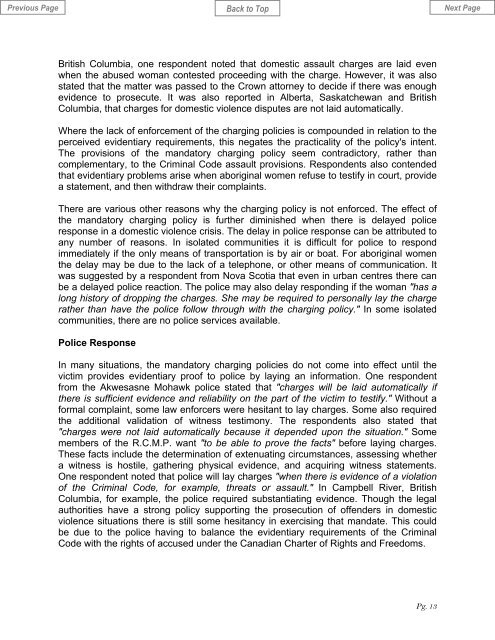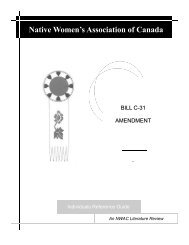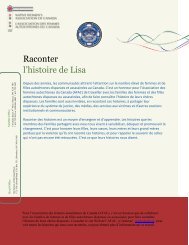POLICE CHARGING POLICIES & DOMESTIC VIOLENCE - Native ...
POLICE CHARGING POLICIES & DOMESTIC VIOLENCE - Native ...
POLICE CHARGING POLICIES & DOMESTIC VIOLENCE - Native ...
- No tags were found...
You also want an ePaper? Increase the reach of your titles
YUMPU automatically turns print PDFs into web optimized ePapers that Google loves.
British Columbia, one respondent noted that domestic assault charges are laid evenwhen the abused woman contested proceeding with the charge. However, it was alsostated that the matter was passed to the Crown attorney to decide if there was enoughevidence to prosecute. It was also reported in Alberta, Saskatchewan and BritishColumbia, that charges for domestic violence disputes are not laid automatically.Where the lack of enforcement of the charging policies is compounded in relation to theperceived evidentiary requirements, this negates the practicality of the policy's intent.The provisions of the mandatory charging policy seem contradictory, rather thancomplementary, to the Criminal Code assault provisions. Respondents also contendedthat evidentiary problems arise when aboriginal women refuse to testify in court, providea statement, and then withdraw their complaints.There are various other reasons why the charging policy is not enforced. The effect ofthe mandatory charging policy is further diminished when there is delayed policeresponse in a domestic violence crisis. The delay in police response can be attributed toany number of reasons. In isolated communities it is difficult for police to respondimmediately if the only means of transportation is by air or boat. For aboriginal womenthe delay may be due to the lack of a telephone, or other means of communication. Itwas suggested by a respondent from Nova Scotia that even in urban centres there canbe a delayed police reaction. The police may also delay responding if the woman "has along history of dropping the charges. She may be required to personally lay the chargerather than have the police follow through with the charging policy." In some isolatedcommunities, there are no police services available.Police ResponseIn many situations, the mandatory charging policies do not come into effect until thevictim provides evidentiary proof to police by laying an information. One respondentfrom the Akwesasne Mohawk police stated that "charges will be laid automatically ifthere is sufficient evidence and reliability on the part of the victim to testify." Without aformal complaint, some law enforcers were hesitant to lay charges. Some also requiredthe additional validation of witness testimony. The respondents also stated that"charges were not laid automatically because it depended upon the situation." Somemembers of the R.C.M.P. want "to be able to prove the facts" before laying charges.These facts include the determination of extenuating circumstances, assessing whethera witness is hostile, gathering physical evidence, and acquiring witness statements.One respondent noted that police will lay charges "when there is evidence of a violationof the Criminal Code, for example, threats or assault." In Campbell River, BritishColumbia, for example, the police required substantiating evidence. Though the legalauthorities have a strong policy supporting the prosecution of offenders in domesticviolence situations there is still some hesitancy in exercising that mandate. This couldbe due to the police having to balance the evidentiary requirements of the CriminalCode with the rights of accused under the Canadian Charter of Rights and Freedoms.Pg. 13
















